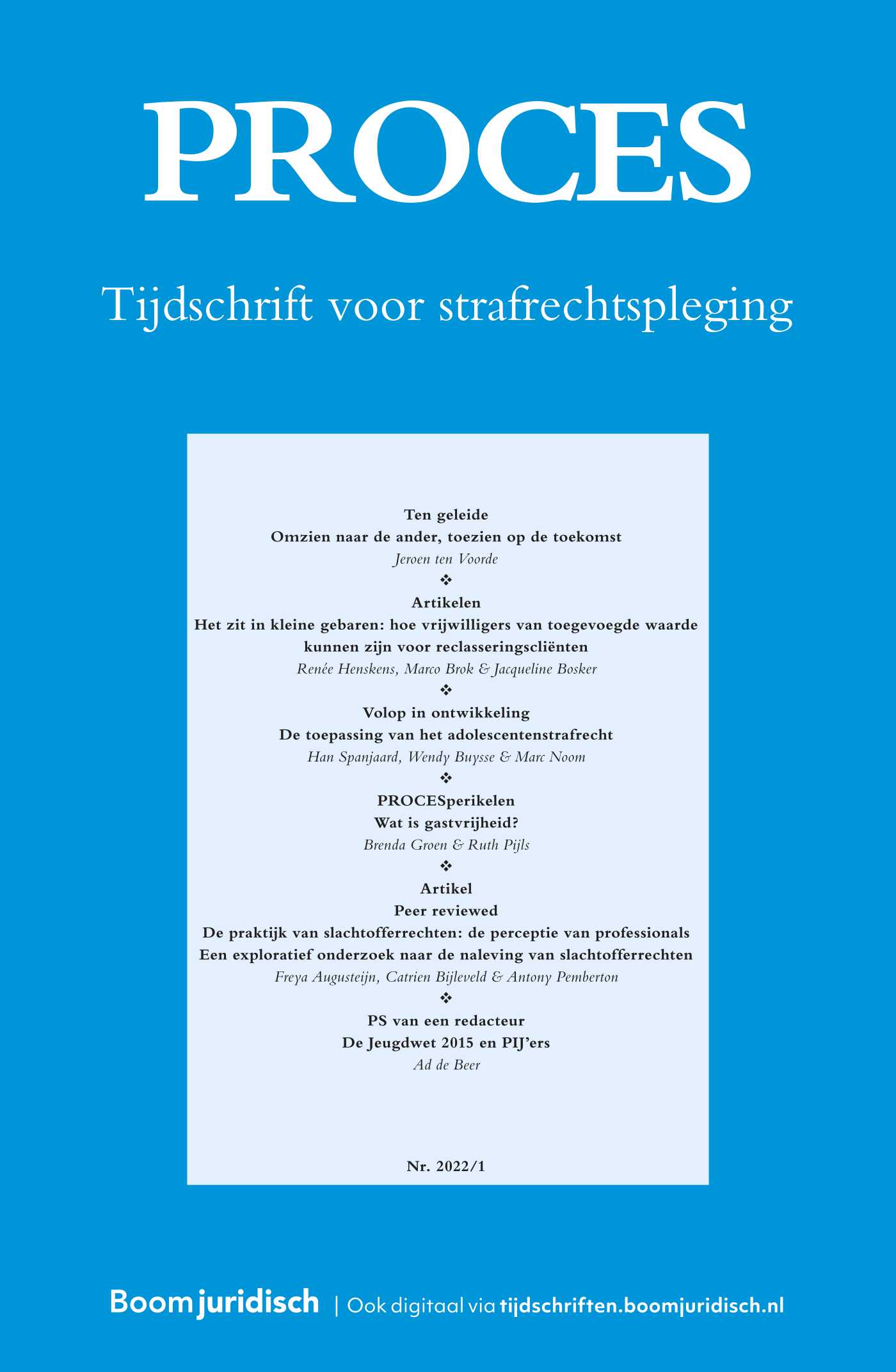|
It is often thought that offenders of human trafficking do not have any social connections with their victims. In this contribution, literature regarding human trafficking in the Netherlands is scrutinized. Also cases that have been presented to the Dutch courts, are looked into. The central question is: what is known about the connection between offenders and victims of human trafficking? Based on an exploration of Dutch literature and cases that have been taken to court, it is demonstrated that offenders and victims often share membership of a social network. It is important that this information is integrated in profiles of offenders in order to develop effective (preventive and reactive) measures against human trafficking. |


PROCES
Meer op het gebied van Criminologie en veiligheid
Over dit tijdschriftMeld u zich hier aan voor de attendering op dit tijdschrift zodat u direct een mail ontvangt als er een nieuw digitaal nummer is verschenen en u de artikelen online kunt lezen.
| Ten geleide |
Gevangen in personeelstekort |
| Auteurs | Joke Harte |
| Auteursinformatie |
| Artikel |
|
| Trefwoorden | mensenhandel, geweld in afhankelijkheidsrelaties, uitbuiting, dwang |
| Auteurs | Aylin Steijvers en Janine Janssen |
| SamenvattingAuteursinformatie |
| Artikel |
Over de ondoorzichtige werking van sancties bij milieucriminaliteitEen discussiestuk en een oproep |
| Trefwoorden | milieucriminaliteit, straftoemeting, werking van sancties, recidive |
| Auteurs | Denis Abels, Marjolein Buijssen, Janine Janssen e.a. |
| SamenvattingAuteursinformatie |
|
Environmental crime has serious consequences for nature, the safety and health of individuals, and the economy. Environmental crime includes the illegal discharge of waste into soil or water, drug waste dumping (toxic waste from the production of synthetic drugs that is dumped in nature conservation areas), illegal emissions by heavy and/or chemical industries, manure fraud and the illegal trafficking in (toxic) waste. In the Netherlands alone, the damage caused by environmental crime amounts to several billion euros per year. The law is an important tool for reducing or preventing environmental crime. However, research done in recent years shows that there is insufficient insight into the system of supervision and enforcement to address environmental crime. For example, more insight is needed into the functioning of and any bottlenecks in the criminal justice chain as regards addressing environmental law transgressions. Research must show which criminal law of administrative law response or sanction is best suited for specific types of environmental crime and types of offenders. In this contribution, we first focus on the administrative and criminal law contexts of dealing with transgressions of environmental law. Hereafter, we consider the question of what is known from past research about the functioning of the system of supervision of environmental law in the Netherlands. Next, we reflect on the question: What do we actually know about the effects of (criminal) sanctions on environmental crime (what works?)? We conclude this contribution with a short conclusion and a call for more research into this important topic. We hope that such research may contribute to a better understanding of the effects of legal sanctions and the achievement of policy goals in the environmental law domain. |
| PROCESperikelen |
Exodus en het Maria Mullerfonds |
| Auteurs | Ita Muller |
| Auteursinformatie |
| Artikel |
|
| Trefwoorden | forensische psychiatrie, gevaar, persoonsgerichte aanpak, zorg en veiligheid |
| Auteurs | M. Segeren, C. Grimbergen, T. Fassaert e.a. |
| SamenvattingAuteursinformatie |
|
The person-oriented approach ‘Psychiatric Patients, Potential Danger’ targets a small population of adults in Amsterdam with a psychiatric disorder who are not adequately in care and pose a threat to themselves and their surroundings. The public health service, with organizations from the care, social and safety sector, tries to restore adequate care/treatment provision in absence of possibilities to deploy criminal law interventions and/or forced care. Its main aim is to reduce the chance of violent incidents with a major impact on society. This paper describes the development and methods of this approach and the main characteristics of the target population. |
| Artikel |
Het ‘anders dan incidenteel’-criterium: de sleutel tot effectieve huisverboden?Een onderzoek naar het ‘anders dan incidenteel’-criterium in de Wet tijdelijk huisverbod |
| Trefwoorden | huisverbod, huiselijk geweld, hulpverlening, Afdeling bestuursrechtspraak |
| Auteurs | Charlotte Turfboer |
| SamenvattingAuteursinformatie |
|
It is unclear how the ‘other than incidental’ criterion in the Temporary Restraining Order Act should be interpreted and to whom that criterion applies. This results in differences in the application of the law and a more limited ability to provide help in situations of domestic violence. By providing the criterion with a clear interpretation and application, the original goals of the legislator can be achieved (again). |
| PS van een redacteur |
Zwijgen bij medeplegen van geweld op MallorcaTot waar reikt strafrechtelijke aansprakelijkheid? |
| Auteurs | Tessa van der Rijst |
| Auteursinformatie |

